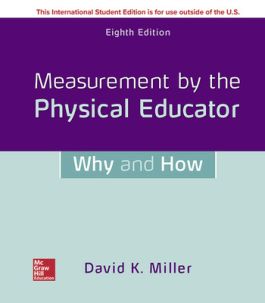Measurement by the Physical Educator ISE
8th Edition
1260569322
·
9781260569322
© 2020 | Published: January 31, 2019
Measurement by the Physical Educator: Why and How, helps the physical education, exercise science, or kinesiology major develop the necessary confidence and skills to measure and assess student' knowledge and physical performance in physical educatio…
Read More
Request Review Access
After purchasing your eBook, login to the McGraw Hill Bookshelf website and redeem the access code from your order confirmation email.
- Access your eBook online or offline
- Easily highlight and take notes
- Fully searchable content
- Syncs across platforms
NOTE: eBook purchase does not include Connect homework or adaptive SmartBook assignments
Measurement By The Physical Educator: Why and How, 8e
CHAPTER 1: Measurement, Evaluation, Assessment, and Statistics
CHAPTER 2: Describing and Presenting a Distribution of Scores
CHAPTER 3: Investigating the Relationship between Scores
CHAPTER 4: Investigating the Difference in Scores
CHAPTER 5: What Is a Good Test?
CHAPTER 6: Construction of Knowledge Tests
CHAPTER 7: Assessment and Grading
CHAPTER 8: Construction and Administration of Psychomotor Tests
CHAPTER 9: Agility
CHAPTER 10: Balance
CHAPTER 11: Cardiorespiratory Fitness
CHAPTER 12: Flexibility
CHAPTER 13: Muscular Strength, Endurance, and Power
CHAPTER 14: Anthropometry and Body Composition
CHAPTER 15: Physical Fitness
CHAPTER 16: Older Adults
CHAPTER 17: Special- Needs Populations
CHAPTER 18: Sports Skills
CHAPTER 1: Measurement, Evaluation, Assessment, and Statistics
CHAPTER 2: Describing and Presenting a Distribution of Scores
CHAPTER 3: Investigating the Relationship between Scores
CHAPTER 4: Investigating the Difference in Scores
CHAPTER 5: What Is a Good Test?
CHAPTER 6: Construction of Knowledge Tests
CHAPTER 7: Assessment and Grading
CHAPTER 8: Construction and Administration of Psychomotor Tests
CHAPTER 9: Agility
CHAPTER 10: Balance
CHAPTER 11: Cardiorespiratory Fitness
CHAPTER 12: Flexibility
CHAPTER 13: Muscular Strength, Endurance, and Power
CHAPTER 14: Anthropometry and Body Composition
CHAPTER 15: Physical Fitness
CHAPTER 16: Older Adults
CHAPTER 17: Special- Needs Populations
CHAPTER 18: Sports Skills
Measurement by the Physical Educator: Why and How, helps the physical education, exercise science, or kinesiology major develop the necessary confidence and skills to measure and assess student' knowledge and physical performance in physical education classes. Beyond just providing measurement techniques, this instructive, readable text also teaches the reason for the measurement and how to apply the results of assessment to the design of learning activities that will meet students' physical activity needs. This book prepares future physical educators for work in a variety of settings, both school and non-school, by providing practical methods of measuring skills, knowledge, physical performance, and physical fitness.

